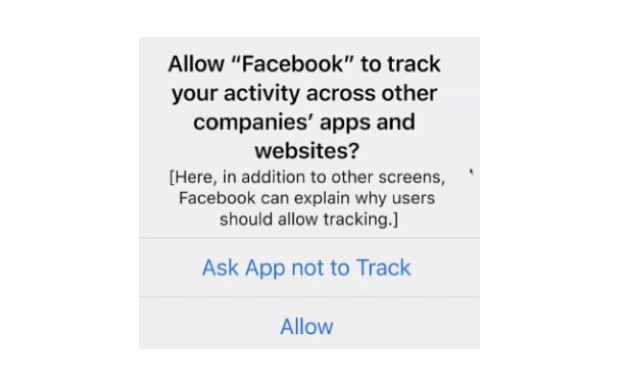Apple launched the new update in their operating system. The new iOS 14 update changes the way Facebook Ads will work. The updates affect the data acquired and processed from conversion tools like the Facebook pixel. It also changed how businesses advertise in mobile apps, how Facebook Ads are optimised, and the targeting and reporting of web conversion events. Overall, there are a lot of changes that will affect Facebook ads. If you are running Facebook Ads, you need to be aware of these changes and how your ad spend will be impacted.
So what exactly is the iOS 14 update all about? Do small businesses need to worry? And what can we do to adapt?
What is the iOS 14 update all about?
The new iOS 14 update that affects Facebook Ads revolved around Apple’s requirement to show a prompt on all iOS 14 devices for all apps installed on that device. Since Facebook is an app, the prompt will appear for Facebook.

This prompt will ask users if they would like to prohibit certain data collection, tracking, and sharing in accordance with Apple’s AppTracking Transparency framework. In order for mobile apps to collect data, users must opt into tracking on iOS 14 devices. If a user opts out of tracking, only limited performance reporting and ad personalisation will be allowed.

When Apple announced the iOS 14 update, a lot of advertisers worried about the effects it has on Facebook Ads. Before we dive into the changes, let’s first clear the biggest misconception about the update. That is, no data will be gathered when a user opts out.
This is not true. Pixel will still be able to track a single event. That is the highest priority event. What does this mean? Here is a scenario:
- I am an iOS 14 user that opted out of the Facebook app tracking.
- I saw an FB ad about a product I want to buy and clicked the CTA button.
- I was directed to a blog post about the product. I read the article and then click Add to Cart.
- I purchased the product.
For this scenario, Pixel will still be able to report a single event, the Purchase event. Provided that the advertiser ranked the Purchase event as the highest priority event.
How is this different from before?
Before the update, Facebook Pixel can track and report all the events that the user completed from the user engagement to the Facebook Ad up to the Purchase. Specifically, it will be able to report the following Pixel events:
- View content pixel event
- Add to cart pixel event
- Purchase pixel event
After the update, Pixel will only be able to report the Purchase event, provided that the advertiser ranked this as the highest priority event.
Delayed Reporting
The update also affected the timing of the reports. Before, when a conversion takes place, advertisers will immediately see the report in the Ads Manager. For the iOS 14 users, the reports will have to rely on the SkAdNetwork and this can take Apple up to three days to send the data.
Why are these updates a problem?
The new update will result in aggregated, restricted, and delayed reporting. This can potentially mean the following results:
- Retargeting will not be as efficient. Delayed reporting means you will not be able to retarget your audience immediately based on the results of your FB Ads. In those 3 days that the results are delayed, you could’ve retargeted the Ads to a different group or segment of audiences.
- If a user opts out, they may be excluded from your remarketing audience. This means that you will be able to reach smaller highly relevant audiences that would make your Facebook Ads less effective.
- Because of these limitations, some of your Ads might be wasted by targeting the wrong audiences. Remember, your ads cost money, so correctly targeting the audience is very important.
How does the iOS 14 prompt feature affect ads for small businesses?
These updates will limit every business’s ability to reach, target, and engage people that are using their mobile devices across the web. It will affect the data analysis of your website’s performance, the ability to control who sees your Facebook ads and how businesses make informed decisions on their advertising budgets.
The most important effects it will have are the following:
- It will limit the effective delivery of ads to users based on their engagement with your business or website.
- It will limit the data gathered from certain customers for the measurement and reporting of conversions.
- Businesses will not be able to ensure that their Facebook Ads will be delivered to audiences at the right frequencies.
- The prediction and optimisation of cost per click (CPC) will not be as efficient as before.
Specifically, the following measurements for Facebook Ads Reporting, Ads Manager, and Ads Insights API will be affected:
- The historical data for 28-day attribution will not be supported. They will only be available via API.
- The 7-day click attribution will still be available however, the 7-day view-through attribution will be gone.
- For offsite conversions that are imported, delivery vs action breakdowns will no longer be supported. The conversions will be reported based on when they occurred instead of when the ad impression happened. This means that targeting based on geographic and demographic can still be done but advertisers will no longer report breakdowns on these factors.

How will it affect small businesses (and big business)?
These changes will greatly influence small businesses and their ability to reach their target audience.
Some of the repercussions of the new iOS 14 prompt could include:
- It will force businesses to have subscriptions and in-app payments. Apple is not getting a share of Facebook Ad revenues but if the an app has a subscription or in-app payments, they get revenues from this app.
- Facebook Ads will be less efficient and effective. If businesses can’t track their user behaviour, tracking through tools like Facebook Pixel will be useless.
- Reduced website sales from Facebook Ads. Facebook studies show 60% fewer website sales from ads due to this update.
- Small businesses will have difficulty in reaching their ideal audience. Unlike big companies, small businesses target their audience through the Facebook pixel. If they can’t get the necessary data to know the target of their ads, their ad budget can’t be allocated properly.
How to prepare for these changes?
You can take certain measures to prepare for the iOS 14 update. Some of them are:
- The attribution view-through data will not be supported anymore. To prepare for this, you can download both your 28-day and 7-day historic data and 28-day clickthrough. You can then compare the 20-day and 7-day click conversions to have a better understanding on how your reported conversions will be affected when you’re using the 28-day window.
- To ensure that your pixel data doesn’t have issues, verify your domain with Facebook. Especially if you have more than one domain that owns your pixel.
- It is also important to take note that this only affects iOS14 users. Watching your own data is the best course of action to understand how this update affects your business.
Overall, the new iOS 14 feature will affect the way Facebook Ads work. We won’t know the complete impact until the changes start to roll out and we are able to review the impact on accounts. Watch this space for further updates.
If you’d like us to review your account with you and give you some tips about how to prepare for the changes, book a call with us. We’ll be happy to help you!
Book a Discovery Call







No Comments